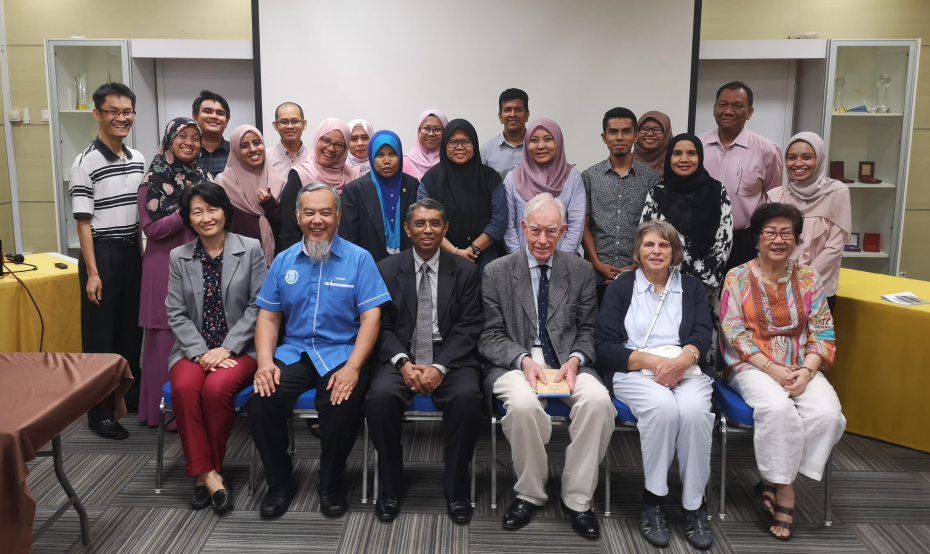The Malaysian Capacity Development Network for Sustainable Water Management (MyCDNet) has organised and conducted the second part of the series of courses for Water Safety Plan (WSP) on 11 – 12 July 2019, held at the Research Management & Innovation Complex in Universiti Malaya, Kuala Lumpur, Malaysia, for 20 participants who were mainly from water agencies nationwide. The Course was held right on the heels of the 2-day MyCDNet Biennial National Forum 2019 that was successfully completed on 10 July at the same venue.
The Part II TOT Course was carried out in collaboration with Specialists from the Malaysian Water Association (MWA), Universiti Malaya, Air Selangor, and Asia Pacific Environmental Consultants (ASPEC), with support from Cap-Net UNDP.
This Part II Course was on prioritising the different types of hazards and risks involved in the provisions of good, safe and consumable water from source to consumers. It provided effective management and control measures within the operational frameworks of the water operators and supply agencies to meet the regulatory water standards for human health. It also ensured water safety accountability at all levels.
The Network Manager of MyCDNet Dato’ Ir Lim Chow Hock opened the Part II TOT Course on Water Safety Plan with welcoming remarks and an introduction of MyCDNet and the Course. It was an intensive one-and-half day course covering 6 modules, 2 exercises, a dialogue session, and a group discussion on case studies followed by a presentation by each of the 3 groups.
Dr Low Kwai Sim, FASc, began with Module 1 – a recap on What is WSP? and Understand the Hazards and Risks. Dr Low was certified by The Water Institute in the University of North Carolina upon completing the 10-week course on Water Safety Plans, in addition to over 40 years of experience as a researcher, academician and consultant covering a wide range of tropical hydrological studies and environmental work ranging from integrated water resources, river basin management to rehabilitations of degraded environments.
For the second part of Module 1, Prof. Victor Hoe Abdullah talked about Water Pollution and Health Risks. Prof Victor is an Occupational Physician with a practice in the Universiti Malaya Medical Centre and a Professor of Occupational and Public Health from the Department of Social and Preventive Medicine, Faculty of Medicine, Universiti Malaya.
Module 2: Identify Hazards and Assess the Risks and Module 3: Determine and Validate Control Measures to Re-assess and Prioritise the Risks were presented by Mr Adnan bin Yusop Ali, with his experience in developing safety cases, CIMAH (Control of Industrial Major Accidents & Health) safety reports, health and safety management system, emergency response plans, safety studies, and integrated risk assessment, for various environmental consultants and oil & gas companies.
Module 4: Develop, Implement and Maintain a Management Procedure and Improvement Plan was presented by Ms Humairah Yeoh. She has been in the water treatment industry for 16 years and involved in water safety plan discussions and implementation with the Ministry of Health (MOH) Malaysia since 2010. With the support and co-operation from the management and team members of her Organisation, the implementation of WSP for the Sg Semenyih WTP has gained significant improvements especially in operational control. Together with the MOH Malaysia, she has an article on the improvement achieved, in a publication under the World Health Organisation and International Water Association.
Mr Kervin Chong presented Module 5: Define and Monitoring of the Control Measures. He has more than 13 years in the field of environmental consultancy with ASPEC and was involved in projects ranging from river basin studies, water resources management, ecological assessment and management, water pollution control and rehabilitation and waste management.
Module 6: Documentation and Record Keeping was presented by Mr Mansor Ghani, a water specialist from the Malaysian Water Association with vast experience in water supply and water resource management and training.
The Dialogue Session on Water Resources and Water Management at the end of Day 1, with specially invited speakers Emeritus Professor Ian Douglas and Datuk Ir Abdul Kadir Mohd Din, was lively, interactive and relevant to local water resource management issues.
Emeritus Prof. Ian Douglas of University of Manchester had worked in Malaysia in the 1960s, returning in the mid-1980s to establish a hydrological research programme at the Danum Valley Field Centre in Sabah with which he was involved for 20 years. He was a consultant on hydrology, erosion and sedimentation to the Mekong River Commission and the Science Co-ordinator of the UK’s Natural Environment Research Council’s Lowland Catchment Research Programme that integrated hydrogeological, hydrological and freshwater ecological studies in rivers mainly fed by groundwater.
Datuk Ir. Abdul Kadir Mohd Din is the Managing Director of Sacra Sol Sdn Bhd, offering advisory services on water, wastewater, by products, green technology and environmental management. He is also the elected President of The Malaysian Water Association (MWA). He has more than 35 years of industry experience in the water and sewerage sectors, with extensive practical knowledge in planning, designing, managing water and sewerage works projects within the country and abroad in the United Kingdom, Brunei Darussalam, Middle East and Singapore.
Day 2 ended with a Group Discussion and Presentation of case studies of existing water safety plans of water operators in several states, looking at the strengths, weaknesses, and areas for improvements. There were three groups and the facilitators, led by Datin Zaharah Binti Haji Mahmud, were tasked to choose the best group based on a checklist of criteria. Participants left the Part II TOT Course on Water Safety Plan armed with new knowledge that can be shared with their teams, and implemented in their organisations.
More photos may be viewed at https://photos.app.goo.gl/Gw1gTxRZMWe3seUN6

